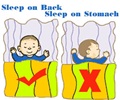The infant deaths caused in the 19th century, which had been attributed to smothering and overlaying by either a co-sleeper or bedding, were actually crib deaths...
The infant deaths caused in the 19th century, which had been attributed to smothering and overlaying by either a co-sleeper or bedding, were actually crib deaths or Sudden Infant Death Syndrome (SIDS), according to an expert.
Dr. Ariane Kemkes, an independent researcher from Scottsdale, Arizona, USA, says that lawmakers would have mislabelled these deaths as neglect and even infanticide, as SIDS had not been identified by then.SIDS is the third most prominent cause of death among infants under a year old, accounting for 30-55 percent of infant deaths during their first year.
Although the specific causes of SIDS remain largely unknown, the infant's age, gender, race, neonatal history and sleep environment are recognized risk factors.
Historically, the sudden death of an apparently healthy baby during nighttime sleep would have been rationalized as accidental smothering or overlaying.
Lawmakers attributed smothering deaths to negligent caretakers and characterized infant-adult bed sharing practices as proof of parental incompetence.
Kemkes investigated if 19th century infant deaths attributed to smothering or overlaying shared the same characteristics as known SIDS cases.
Advertisement
She found that, just like SIDS, smothering and overlaying deaths occurred primarily during the second to fourth month of the baby's life.
"The study strongly supports the hypothesis that these infant deaths represent empirical evidence of 19th century SIDS mortality," concluded Kemkes.
The findings have been published online in Springer's journal Human Ecology.
Source-ANI
LIN









